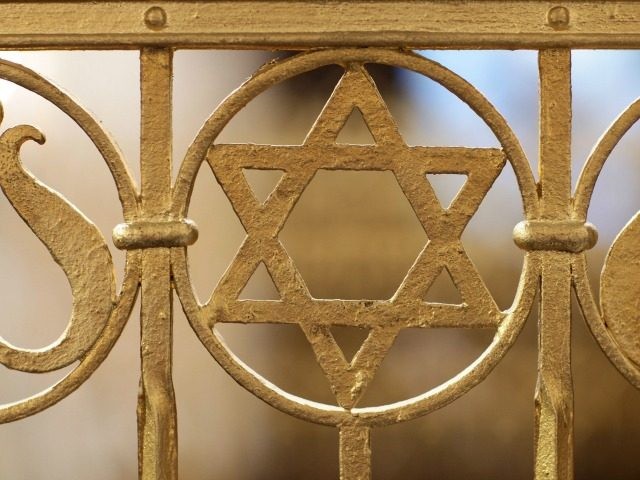The Russian Defense Ministry accused President Volodymyr Zelensky on Wednesday of using a Ukrainian synagogue “as gathering and transfer points for weapons and Nazis to participate in hostilities.”
Ministry spokesman Major General Igor Konashenkov claimed that a Jewish whistleblower in Uman, Ukraine, had sent Russian officials “evidence” that synagogue spaces were being used to hide weapons and that Ukrainian forces were falsely labeling transport units as school buses to avoid attack. The Russian government published photos allegedly confirming the claims.
Russian leader Vladimir Putin announced a full-scale invasion of Ukraine in late February with the goal of “de-Nazifying” the country. Russian Foreign Ministry Sergey Lavrov referred to Zelensky, Ukraine’s first Jewish president, as a “neo-Nazi” in an interview with ABC News in March. The Russian government has offered no evidence that Zelensky has expressed any sympathies for Nazism and Zelensky has enthusiastically rejected the label.
“Today we present evidence received from a member of the Uman Jewish community of the use by the [Ukrainian President Vladimir] Zelensky regime for these purposes of the building of the new city synagogue, located at 1 Shosseiny Lane,” Konashenkov, the Defense Ministry spokesman, said on Wednesday, according to the Russian news agency Tass.
The Russian government considers Zelensky’s “regime” illegitimate because pro-Russian President Viktor Yanukovych resigned amid protests in 2014, an event Russia claims was an American “coup.” Zelensky defeated Yanukovych’s successor, Petro Poroshenko, in a free election in 2019 where opponents branded him a “pro-Russian” candidate.
“The object of the Jewish cult in Uman is deliberately used by the Kiev nationalist regime for military purposes in order to provoke a conflict and political pressure of Jewish religious organizations on Russia in case of fire on it,” Konashenkov claimed.
The Defense Ministry published photos allegedly showing the violations on the day after Zelensky addressed the Knesset, the Israeli legislature. In that speech, Zelensky compared the Russian war in his country to the Holocaust and accused Russia of “using the terminology of the Nazi party,” claiming the war to be Russia’s “final solution” to Ukraine. Putin similarly accused Zelensky’s government of “genocide” in a speech to a packed stadium to celebrate the colonization of Crimea, Ukraine, this month.
❗️Russian Defence Ministry: The #Kiev regime uses places of worship (including synagogues) and any other places of public worship as collection and transfer points for weapons and Nazi militants to take part in hostilities.
🔗 https://t.co/l3IFCvpMWC pic.twitter.com/I7IomyOi71
— MFA Russia 🇷🇺 (@mfa_russia) March 30, 2022
No independent verification of the Russian claims has occurred at press time. Both Russia and Ukraine have made a long list of allegations of war crimes and other human rights abuses in the war, many of them unverified, since the latest stage of the war began. Russia first invaded Ukraine in 2014.
In February, Putin announced that the 2014 invasion – which resulted in Russia colonizing Ukraine’s Crimean peninsula, which it occupies to this day – would expand into a “special military operation for de-militarization and de-Nazification of Ukraine.” Putin also accused Zelensky’s government of “genocide” then, arguing that the war in eastern Donbas, Ukraine, that began in 2014 was an attempt by the Ukrainian government to erase ethnic Russians from the region.
“Russia cannot feel safe, develop, and exist with a constant threat emanating from the territory of modern Ukraine,” Putin said.
While Russia has not been fully explicit in what it would consider a victory in Ukraine other than “de-Nazification,” Russian officials have listed “terms of surrender” to Zelensky that include “a guarantee of neutral status and the promise of no weapons on its territory.”
“According to Peskov, Russian President Vladimir Putin has expressed his preparedness to engage in discussions with his Ukrainian counterpart, with a focus on obtaining a guarantee of neutral status and the promise of no weapons on its territory,” Russian outlet RT reported in late February. “These are terms that, according to Peskov, would enable the achievement of the demilitarization and denazification of Ukraine, and eliminate what Russia currently views as a threat to the security of its state and people.”
Lavrov, the Russian foreign minister, has referred to Zelensky as a “neo-Nazi,” suggesting that his removal from power is also a Russian military goal.
“I think that the Nazis and neo-Nazis manipulate,” Lavrov told ABC’s George Stephanopoulos when asked directly if he believed Zelensky is a Nazi. “Otherwise, it is hard to account for how President Zelensky can preside … over a society where neo-Nazis make strife. They make marches and torch processions, and for those torch processions, President Zelensky allocates his personal guards from his company, and they train constantly, studying acts of sabotage and warfare in urban areas. And that is all happening under President Zelensky.”
Zelensky has expressed personal offense at being accused of Nazism.
“They tell you that we’re Nazis. But how can a people that lost eight million lives to defeat the Nazis support Nazism? How can I be a Nazi?” Zelensky said in an address directed to the Russian people after Putin announced his “special operation.” “Say it to my grandfather, who fought in World War II as a Soviet infantryman and died a colonel in an independent Ukraine.”
Follow Frances Martel on Facebook and Twitter.

COMMENTS
Please let us know if you're having issues with commenting.